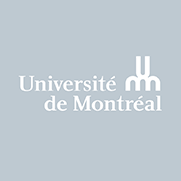
Jean-Philippe Gratton
Biologie des cellules endothéliales
- Professeur titulaire
-
Faculté de médecine - Département de pharmacologie et physiologie
Media
Profile
Research expertise
Les cellules endothéliales tapissent la totalité des vaisseaux sanguins, elles sont ainsi positionnées stratégiquement afin d’influencer le flot sanguin et le développement de nouveaux vaisseaux. Nous consacrons nos travaux à l’étude des mécanismes cellulaires qui contrôlent la prolifération, la survie et la différentiation des cellules endothéliales. Grâce à des techniques de biologie moléculaire et cellulaire ainsi qu’à de la pharmacologie moderne, nous étudions les éléments qui régulent la signalisation intracellulaire de certains facteurs de croissance endothéliaux. Entre autre, nous étudions l’influence des mouvements intracellulaires du récepteur au facteur de croissance de l’endothélium vasculaire (VEGF) sur sa signalisation ainsi que les implications cellulaires de sa localisation dans certains microdomaines membranaires. De plus, nous tentons d’identifier de nouvelles composantes de la signalisation endothéliale du VEGF qui affectent la libération d’oxyde nitrique (NO) des cellules endothéliales. L’étude de la biologie des cellules endothéliale a une importance dans le domaine des maladies cardiovasculaires ainsi que dans l’étude du développement de nouveaux vaisseaux dans les tumeurs (angiogénèse).
Thématique de recherche
- Implication des microdomaines lipidiques de la membrane plasmique dans les mécanismes de la signalisation intracellulaire du VEGF
- Régulation de la synthase endothéliale du monoxyde d'azote (eNOS)
- Étude des mécanismes cellulaires qui contrôlent la prolifération, la survie et la différentiation des cellules endothéliales
- Dysfonctions endothéliales
- Angiogénèse tumorale
Biography
Jean-Philippe Gratton a dirigé l'unité Biologie des cellules endothéliales de l'Institut de recherches cliniques de Montréal depuis 2002. Il est également directeur du Département de pharmacologie de l'Université et titulaire de la Chaire de recherche de l’Université de Montréal en signalisation des cellules endothéliales et angiogénèse depuis 2013.
education
- 2002 — Fellow Post-doctoral — Pharmacologie — Yale University School of Medicine
- 1998 — Doctorat — Pharmacologie — Université de Sherbrooke
- 1995 — Maîtrise — Pharmacologie — Université de Sherbrooke
- 1992 — Baccalauréat — Biochimie — Université de Sherbrooke
For more information…
Affiliations and responsabilities
Research affiliations
Research units
Titulaire
- Chaire Merck Canada en pharmacologie de l'Université de Montréal
- Chaire de recherche de l’Université de Montréal en signalisation des cellules endothéliales et angiogénèse
Directeur
Membre
- Membre de l'Oncopole
Teaching and supervision
Student supervision
Theses and dissertation supervision (Papyrus Institutional Repository)
Rôle de Zonula Occludens-1 (ZO-1) dans la régulation des granules de stress et dans la réponse intégrée au stress dans les cellules endothéliales
Cycle : Doctoral
Grade : Ph. D.
Rôle de la petite GTPase Rap1 dans les effets proangiogéniques de l’angiopoïétine-1 sur les cellules endothéliales
Cycle : Master's
Grade : M. Sc.
Rôle inattendu de la protéine des jonctions intercellulaires Zonula Occludens-1 (ZO-1) dans la régulation de l’ARN et de la prolifération des cellules endothéliales.
Cycle : Doctoral
Grade : Ph. D.
The regulatory role of eNOS-derived nitric oxide on transcription in endothelial cells: Impact of S-nitrosylation on β-catenin signaling
Cycle : Doctoral
Grade : Ph. D.
Étude des mécanismes cellulaires activés par l'Angiopoïétine-1 et le VEGF régulant la perméabilité et la migration endothéliales
Cycle : Doctoral
Grade : Ph. D.
Modulation de la signalisation du récepteur de type 2 du facteur de croissance de l’endothélium vasculaire (VEGFR-2) par l’ubiquitination
Cycle : Master's
Grade : M. Sc.
Étude des événements moléculaires impliqués dans l'activation de la synthéase endothéliale du monoxyde d'azote (eNOS) par le facteur de croissance de l'endothélium vasculaire (VEGF)
Cycle : Master's
Grade : M. Sc.
Régulation intracellulaire du VEGFR-2 menant à l'activation d'eNOS dans les cellules endothéliales
Cycle : Doctoral
Grade : Ph. D.
Projects
Research projects
Role of ZO-1 in endothelial cell stress responses and in tumor angiogenesis
eNOS regulates endothelial cell polarity and angiogenic sprouting in vascular pathologies
Targeting PAK2 to inhibit tumor angiogenesis and immune evasion
Role of ZO-1 in endothelial cell stress responses and in tumor angiogenesis.
Role of PAK2 in tumor angiogenesis and in the tumor microenvironment
Role of ZO-1 in endothelial cell biology and in tumor angiogenesis.
Signaling events that regulate endothelial intercellular junctions and angiogenesis
Implication des jonctions cellulaires dans la signalisation intracellulaire médiée par PAK2 dans les cellules endothéliales et lors de l'angiogenèse tumorale
Imaging of endothelial cell biology and angiogenesis
Mechanisms of breast cancer metastasis: Understanding the roles and molecular functions of the RTK AXL
Understanding the role of zo-1 in endothelial cell junctions and in tumour progression
Role and regulation of PAK2 in endothelial cells and in tumour angiogenesis
Role of PAK2 in angiopoietins/Tie2 signaling in endothelial cells and in angiogenesis
Imaging of endothelial cell biology and angiogenesis
REGULATION OF ENDOTHELLAL VEGF RECEPTOR-2 SIGNALLING BY UBIQUITINATION AND HSP90 ACTIVITY IN ANGIOGENESIS
Mechanism of breast cancer metastasis: AXL signaling in the tumoral microenvironment
Description
The most important clinical factor associated with poor survival during breast cancer progression is the appearance of metastasis. It is such secondary tumor sites, often far away from the initial breast tumor, that threaten the life of afflicted women. Our research program aims at uncovering the molecular mechanisms that facilitate both the escape of cancer cells from the breast tumor and their ability to enter blood vessels to ultimately travel to secondary tumor soil where they can grow as metastasis. Dr. Côté and his team focus on a protein named AXL that is found at the surface of both the cancer cells and the tumor blood vessels. The presence of AXL in human breast tumors correlates with the formation of metastases. Here, they propose to study how AXL is working in both the tumor cells, to promote their motility, and in the blood vessels, to facilitate the seeding of the tumor cells at distant sites. To achieve these objectives, they will use engineered mice that recapitulate human breast cancer in addition to cell culture models to study cell movement and blood vessel integrity.
Regulation of endothelial VEGF receptor-2 signaling by ubiquitination and HSP90 activity in angiogenesis
Description
Understanding the intracellular mechanisms by which growth factors produce their effects in endothelial cells is an important aspect of vascular biology. Endothelial cell are intimately involved in formation of new blood vessel, termed angiogenesis, and in the control of vascular tone. Vascular endothelial growth factor ( VEGF ) is an important factor for endothelial cells as it promotes their proliferation, survival and angiogenesis. Angiogenesis is deregulated in several cardiovascular pathologies such as atherosclerosis and cardiac infarct. In this proposal, we will attempt to modulate the ability of VEGF to control angiogenesis by altering cellular processes that affect the degradation and stability of VEGF receptors in endothelial cells. Furthermore, we will investigate how the release of nitric oxide, a critical factor produced by endothelial cells in response to VEGF, is affected by the modulation of VEGF receptor degradation.
Defining new approaches to modulate the effects of an essential factor for the formation and maintenance of blood vessels will hopefully open the way to the identification of novel therapeutic targets in cardiac and vascular diseases.
DOSSIER 27024 ELUCIDATION DES MECANISMES DE SIGNALISATION INTRACELLULAIRE REGULANT LA BIOLOGIE DES CELLULES ENDOTHELIALES ET L'ANGIOGENESE
CHAIRE DE RECHERCHE DU CANADA EN SIGNALISATION FONCTIONNELLE DES CELLULES ENDOTHELIALES
Research exploitation
Colloque Signalisation Québec 2012
Description
Organisation du Colloque Signalisation Québec 2012, 13 au 15 juin 2012.
Outreach
Publications and presentations
Disciplines
- Molecular Biology
- Pharmacology
Areas of expertise
- Angiogenesis
- Cell
- Combinatorial Chemistry
- Chromosome (Living Organisms)
- Inorganic and Organometallic Compounds
- Gene (Living Organisms)
- Macromolecules
- Organic Molecules and Biomolecules
- Quantum Phenomena
- Chemical Synthesis and Catalysis
Aide en ligne pour votre profil | Nous joindre
Le Répertoire des professeurs est propulsé par les données du ![]() SADVR et est un projet du CENR.
SADVR et est un projet du CENR.


